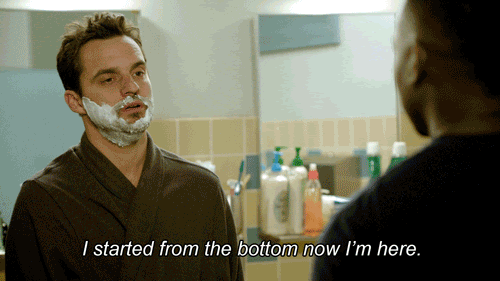If I had to guess, you’re reading these words for one of the following reasons:
- You want to write better copy
- You’ve never written a word in your life and want to know where to start
- You have five minutes to kill and have stumbled across this while waiting for your bus/train/private jet/takeaway/etc.
- You are my family member and have no clue what I’m on about, but want to support me anyway (thanks)
I’m right? Of course I am. And not only am I a world-renowned guesser, but I’m also an extremely talented writer, with professionals all over the globe coveting my skills, and company after company at my feet begging me to write for them (please, Google, no more flowers!).*
“But Poppy”, I hear you ask, “you’ve only been a copywriter for a few months, how have you already reached this level of international writing fame?”. Well, while a great deal of my success is down to pure, unfiltered, God-given talent, I’ve learned a few tips over the course of my lengthy career that have improved my skills greatly - and I’m here to share them with you. Cue: seven tips which, if properly employed, will make you a better copywriter.

1. Write with confidence (even if it’s obviously forced)
You’ve heard of the age-old phrase, fake it ‘til you make it? Just as this applies to, say, convincing wealthy socialites you’re one of them with the aim of infiltrating their social circle and eventually scamming them out of their riches, it also applies to writing. Write as if you’re an expert on the subject, no matter what it is, and chances are the reader will believe you. If you don’t, the words you write won’t sound like an authoritative source of information (which means search engines won’t care about them), and people probably won’t listen to them as a result. This means no clicks, no buys, no likes on Twitter - and that’s pretty much the kiss of death for a copywriting career.
*See above for an example of this tip in motion.
2. Have your grammar and spelling nailed
If your planning on persuing a carer in copyrighting, you absolutley need to get a handel on the fundimentles (god, even ironically writing that sentence hurts, what have I become?). As a copywriter in an agency, you’ll be the first port of call for grammar questions, spell checks and proofreading needs. If you can’t answer the questions, or miss some key errors when reading over someone else’s blog, you’re not going to gain a great reputation. Worse? Your colleagues will probably lose a little respect for you every time you put an apostrophe in the wrong place, or use the wrong ‘their’. Oh, the shame.

Earn the respect of your colleagues by pointing out their typos constantly.
3. Don’t forget about tone of voice
Whether you’re writing as yourself or taking on the voice of a company, having the right tone of voice is vital. When writing about subjects that are heavy in facts and could inform the reader about genuinely important matters, like healthcare, you should probably veer away from irreverence and doctor puns - no matter how funny they are. Conversely, if you’ve been tasked with a blog about the world’s cutest puppies, it calls for a more lighthearted tone and a couple of dog themed one-liners every now and then. Get the tone of voice right, and you’re basically half way there.
4. Don’t take it personally
Look, people are going to alter your words. They’re going to dislike what you’ve worked hard on. They might even remove the single best line you’ve ever written in your life. It’s just part of the job. Smile politely, hide your insurmountable grief, and know that they’re not criticising you personally. They just have worse taste than you, word-wise, and it’s not their fault. Just suck it up and make their changes - you’ll have forgotten about the line in a couple of weeks when someone else removes the other single best line you’ve ever written. It’s a vicious cycle.

5. Learn how to unashamedly pester
A lot of the time, you’ll have to follow up on briefs, ask questions about what you’re meant to be writing, or have no idea what the data sheet in front of you means. In these scenarios, it’s time to learn how to pester. If you’re like me, the thought of asking the same person the same question again fills you with dread. However, there will be instances when you have to do it. Everyone’s busy, and your question can easily disappear under a digital pile of messages. If you know you have to get something done by a certain day, just keep asking until you have everything you need to get it done. Pester now, apologise later.
6. Harness the power of the blag
If you take anything from this list, I implore you, make it the grammar and spelling thing. After that, though, this tip’s a big one. You’re not going to be an expert on everything you have to write about, or have time to become one, so you’ll have to hone your bullshitting skills. Write an entire essay about daffodils using only one fact, present a slideshow to your family about the importance of butter without going on the internet once, speak non-stop for a minute about the politics of coal without repeating yourself. I don’t care how you do it, just learn how to blag. You want proof that it works? I’ve written a whole blog about a job I’ve only had for six months.

7. Make yourself available
Practice makes perfect, so to improve your writing, you need to do more writing. Let your colleagues know that you’re happy to help them with any word-based questions, and that you’ll take on tasks that might not suit your current skill set, as well as ones that do. Not only will you seem like a cool, approachable person, but you’ll get more in your portfolio and gain more experience as a result. Win, win.
Bonus tip: write for people, not search engines
When it comes to writing for the best SEO results, don’t overthink the technical side of it. Google wants you to write like a human, since it’s people, not machines, reading the content. The job of search engines is to serve the intent of those doing the searching, so don’t overdo the keywords and lose the natural tone of your copy as a result. This will mean more people reading your words, sharing your words and, as a result, your words ranking higher on Google.
Like the look of the words on this page? I don’t blame you (see, confidence). Get in touch with Rise at Seven to work with us, or work for us. We really don’t mind - we’ve heard you’re pretty cool and just want to meet you.

















